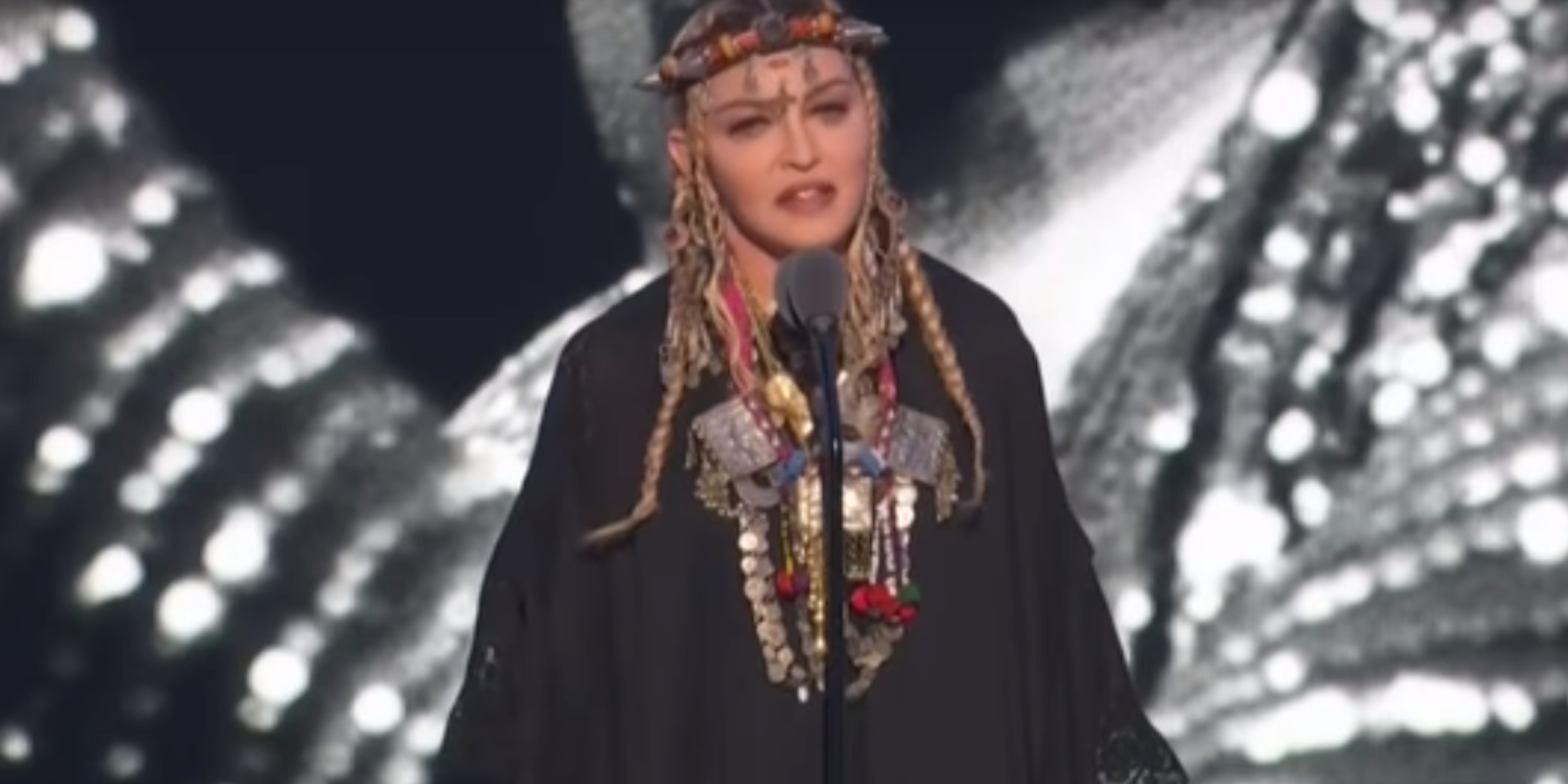Opinion
Viewers and Aretha Franklin fans questioned why MTV thought Madonna was a good candidate to speak about the Queen of Soul’s legacy on Monday. The tone-deaf tribute demonstrates a longstanding problem with white women, white feminism, and society: The constant centering of white women in Black women’s achievements and legacies. It wasn’t the only time it happened this week.
Madonna is facing harsh criticism after delivering a speech at the VMAs that was meant to pay tribute to Franklin, but proved to be a self-indulgent autobiography—another plain-as-day example of white women taking center stage for Black women’s legacies and achievements when it should’ve never been about them in the first place. The singer started her “tribute” by recounting how her singing career started despite having “no training or dreams of ever becoming a singer” and launching into a story about an audition where she sang Franklin’s famous “(You Make Me Feel Like) A Natural Woman” a capella.
“I could see that they didn’t take me seriously, and why should they?” she recalled. “Some skinny-ass while girl is going to come up here and belt out a song by one of the greatest soul singers who ever lived?”
This audition didn’t lead to Madonna’s big break, but nevertheless, she credited Franklin’s music for inspiring her.
“I want to thank you, Aretha, for empowering all of us. R-E-S-P-E-C-T,” she said. “Long live the queen.”
The Twittersphere had some anticipated outraged reactions. Even buttoned-up outlets like NPR led with the headline, “Madonna Celebrates Madonna.”
https://twitter.com/HannnSandwih/status/1031746160350953472
https://twitter.com/SowmyaK/status/1031745034633265152
I want to know which #VMAs producer read Madonna’s script, and decided this was the ideal tribute to ARETHA FRANKLIN. pic.twitter.com/vW7sqYzxit
— Evette Dionne (@freeblackgirl) August 21, 2018
The gaffe comes at the same time that concerns about the future of the Me Too movement arose. Court documents revealed actress and activist Asia Argento paid $380,000 to a young actor and musician, Jimmy Bennet, who said Argento sexually assaulted him when he was 17. Many online this week questioned if the actor’s discretion would discredit the movement. Bennet was launched into the forefront of the Me Too movement after accusing Harvey Weinstein of sexual assault, and joined in the limelight by other white female actresses like Alyssa Milano and Rose McGowan. Meanwhile, the movement’s founder, a Black woman named Tarana Burke, barely received any recognition for starting the movement and her name only slowly made it into media headlines after Black women pointed it out. Why didn’t anyone ask what the person who started an international activist campaign thought about recent developments?
She had a good response, too. On Twitter, Burke responded to the news about Argento by reminding the public that the movement must decenter individuals and focus on addressing the power and privilege that enables sexual violence.
I’ve said repeatedly that the #metooMVMT is for all of us, including these brave young men who are now coming forward. It will continue to be jarring when we hear the names of some of our faves connected to sexual violence unless we shift from talking about individuals [+]
— Tarana (@TaranaBurke) August 20, 2018
…and begin to talk about power. Sexual violence is about power and privilege. That doesn’t change if the perpetrator is your favorite actress, activist or professor of any gender.
— Tarana (@TaranaBurke) August 20, 2018
And we won’t shift the culture unless we get serious about shifting these false narratives.
Though it would make complete sense for the Me Too movement to decenter white women, Madonna paying tribute to Franklin with a speech all about herself proves how difficult that continues to be. If a white woman could not decenter herself in the celebration of the life of one of the greatest artists ever, how can anyone expect white women to know their place in the movement and act accordingly?
These are not isolated examples. White women have always tried put themselves at the forefront of Black women’s legacies. Back in March, Black activist Feminista Jones—who created the hashtag and movement #YouOkSis—had to address its appropriation by a Pennsylvania venue holding a fundraiser for domestic violence survivors that used the hashtag on a flier that only featured white women.
“That hashtag/ campaign/ movement was not meant to be used to serve the interests of White Women, especially not financially. So we have a very clear example of WW exploiting the labor of BW/WOC for their own agenda,” Jones wrote in a tweet.
Then, of course, there are the relentless examples of white women appropriating and being credited for cultural trends started by Black women, who are oftentimes left in the shadows. A simple YouTube or Google search of the word “twerk” would leave anyone without knowledge of the dance’s origins thinking it was invented by Miley Cyrus, Iggy Azalea, or white female dancers, despite the fact that it’s clearly a dance with African roots. If that sounds like a low-stakes complaint, consider that white woman Rachel Dolezal literally pretended to be a Black woman for years and even supplanted Black women (and men) in a position of leadership for the NAACP—an organization built with the labor of the Black community.
The accomplishments and legacies of Black women do not come without strenuous work and perseverance in the face of constant discrimination and hardship. Especially in the United States. They should be respected and protected. The only way that will happen is if white women step out of the limelight meant for Black women and into their own lane. Until then, Black women will speak up and call out white women like Madonna and Argento who step into the forefront where they do not belong.


